
The 10th edition of the Sankalp Africa Summit brought more than 1,500 stakeholders representing 60 and 40 African countries. During the summit, entrepreneurs endeavouring to reshape Africa's socio-economic and health opportunities to improve the lives of millions, had a platform to build better relations, discover new opportunities, explore sustainable development strategies, and forge unlikely alliances with new partners.

The 90 minute knowledge session titled, ‘Transforming Impact through Partnerships for Nutrition Development’ was a sector-specific breakaway, attended by over 50 delegates representing multilateral agencies, NGOs, investors, and entrepreneurs.
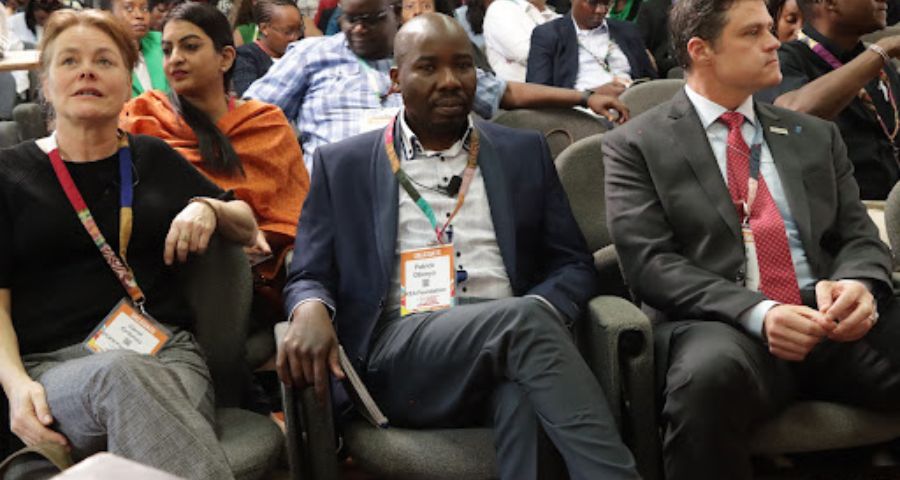
Public Private Engagement (PPE) for Nutrition
Keynote talks from Aime Kwizera, N3F Programme Manager; Lilian Nyamongo, Associate at Nutrition Connect; and Maureen Muketha, SBN Coordinator, Kenya, showcased the role of GAIN's Nutrition Enterprise Unit (NEU) cluster, Nutrition Connect, and SUN Business Network (SBN) in scaling nutrition impact.
GAIN's Nutrition Enterprise Unit (NEU) serves as a hub for supporting Small and Medium Enterprises (SMEs) in nutritious food value chains. NEU includes the following programmes:
- Technical assistance leveraging on partnerships through Nutrition Impact at Scale (NIS)
- Development of financial services through the Nutritious Food Financing Facility (N3F)
- Advocacy of SMEs through the SUN Business Network (SBN)
The cluster also supports and works in close coordination with several other projects seeking to develop different aspects of food value chains, like Nutrition Connect, which endeavours to bring together private and public sector partners for improving nutrition and better diets for all.
"We work with SMEs to make sure that there is accessibility of food, safe and nutritious food. In all the programs GAIN is implementing, we aim to promote the safe consumption of nutritious food across all the programs. NEU looks at how to support entrepreneurs to make GAIN's mission a reality,” explained Kwizera.
“Nutrition Impact at Scale (NIS) a platform of NEU, has been leveraging support to help Enterprise Support Organisations (ESOs) and SMEs increase their technical knowledge to attach a ‘nutrition lens’ to business development and food production. NIS allows SMEs to evaluate the quality of the products concerning diet and offers insights on measures they need to take to improve its nutrition quality,” were Kwizera’s concluding remarks.
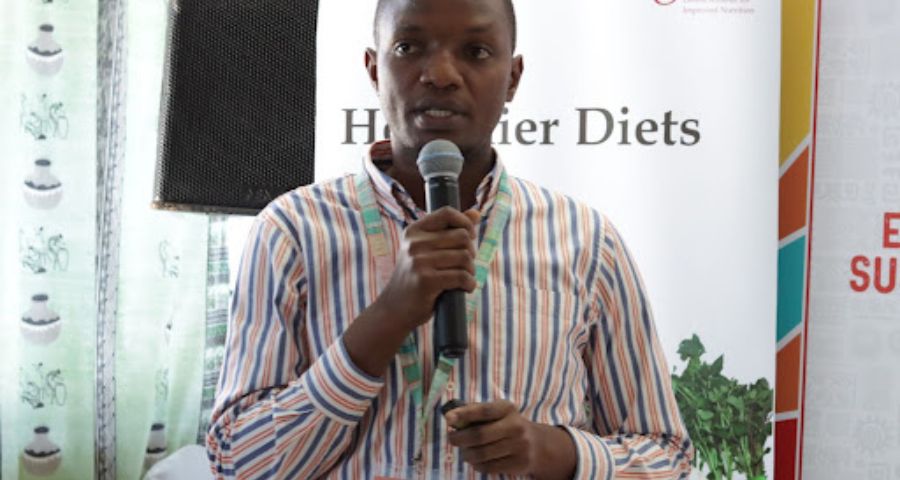
GAIN aims to help SMEs amplify the production of nutritious foods by overcoming the technical and financial barriers they experience. GAIN co-convenes the Scaling Up Nutrition (SUN) Business Network (SBN) with the UN World Food Programme (WFP). SBN is a global network that fosters partnerships and collaborations by engaging and mobilising businesses to innovate and invest in sustainable actions in emerging markets to ensure food security for all people.
The NEU cluster collaborates closely with initiatives within GAIN for improved and more nutritious food value chains, like Nutrition Connect which is a knowledge platform convened by GAIN for contributing to current dialogue, new evidence, and sharing experiences on public-private engagement (PPE) for nutrition.
“We are building a community of practice, online and in-person, at events such as Sankalp with businesses, policymakers, and academia. At Nutrition Connect, we focus on the 3Cs. i.e. collaborate, create and co-learning. Therein we seek to bring together and work with new and existing partners in the private and public sector and civil society, working on improving food and nutrition security; curate and share key knowledge and learnings gained to ensure we can build business cases for better nutritional outcomes. Lack of relevant data and information hinders transparency, accountability, and advocacy for building collaborative engagements,” Lilian Nyamongo remarked.
Maureen Muketha introduced the audience to the SUN Business Network (SBN). "SBN is a global network that exemplifies a successful model of the implementation of public private engagement (PPE). SBN is one of the four networks convened by the Scaling Up Nutrition (SUN) Movement set up by the UN Secretariat to support countries in developing a multi-stakeholder approach to Nutrition and supports country-level action to end all forms of malnutrition."
SBN Kenya was highlighted at the country level as an example of a public, private engagement model in advancing nutrition. The network has provided a platform for businesses to participate in crucial decision-making processes such as policy formulation, profiling them on critical international days like World Food Day and sensitisng policymakers on the importance of investing in nutrition and providing an enabling business environment.
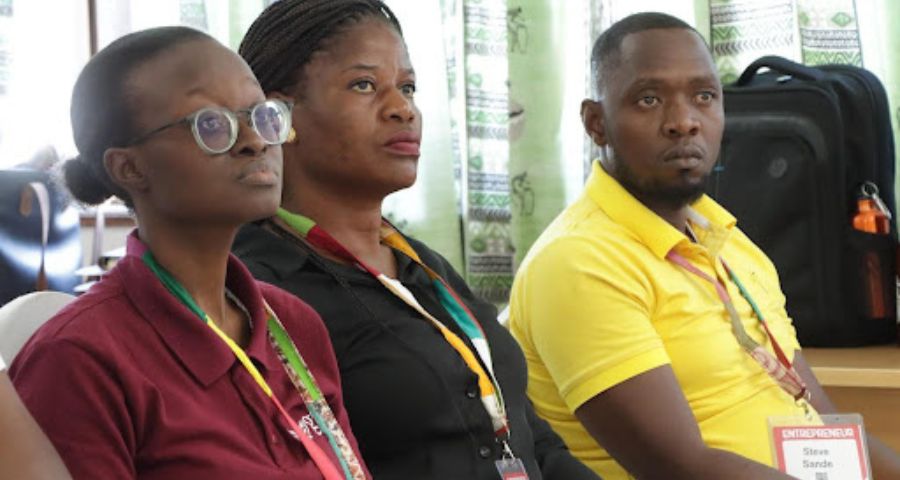
Attending the forum were also SBN member SMEs from Tanzania - Beatrice Msafiri, CEO of Bivac foods which produces fortified cereals and flour, and Steve Sande, the Founder and CEO of Kamsa Poultry Ltd. based in Kenya, a poultry company producing affordable yellow-yolk eggs. In a separate interaction Beatrice and Steve detailed their entrepreneurial journeys that are today acknowledged by peers amongst SMEs and partners like SBN, as success stories that possess many learnings.
Scaling Nutrition Impact through Enterprise Support
The second part of the knowledge session was a panel discussion moderated by Yetunde Olarewaju, Senior Associate of Planning and Communications at GAIN. Aime Kwizera, Lilian Nyamongo, Frashiah Mwebia, CEO of Jufra Food Processors; Francis Nderitu, Managing Director Raino Foods; Margaret Ngetha, SBN Africa Regional Manager and Celia Ribeiro, Founder - Luteari Insumos & Serviços Agrícolas, Lda were panellists therein.
Key takeaways from the panel discussion included:
Build viable business models for reaching low-income consumers
When addressing viable business models for reaching low-income consumers, a business must be able to earn a profit. How can nutrition-focused SMEs have profitable and sustainable business models? Francis Nderitu of Raino Foods explained how he provides affordable, reliable, and efficient cold chain solutions to support the fish and poultry sector in East Africa.
"We have introduced over 300 cooling boxes in low-income and peri-urban areas where cooling systems are not affordable. They don't pay for this asset; we lease it to them for a very affordable fee of about 5 USD a week. By doing that, we are opening markets that did not exist,” said Nderitu. Raino Foods has developed strategies such as selling waste products that have helped its business earn more profits.
“The offcuts and trimmings during the poultry cutting and processing are packaged and sold at an affordable price of around USD 0.4 or KES 40 per kilo. Low-income consumers buy these less popular cuts but get a protein source at an affordable price,” said Nderitu.
The key role of PPE in scaling SMEs
GAIN strongly advocates for partnership as it cannot achieve its goals alone, thus leveraging partnerships by closely working with entities like governments, communities, businesses, NGOs, and academics. Through various initiatives like SBN and Nutrition Connect, GAIN technically supports SMEs and acts as a convenor among multiple public and private actors. Partnerships are part of GAIN’s core and are crucial in harnessing know-how, finance, innovation, technology etc to minimize malnutrition's lasting health and socio-economic burden.
During her presentation, Lilian Nyamongo emphasized the importance of embracing their three-pronged approach that involves convening, collaborating, and co-learning between the public and private sectors.
“SBN is a good example of a PPE model, where they mobilise the private sector to commit and invest in improved business practices that contribute to national nutrition priorities,” explained Nyamongo.
As a knowledge platform, Nutrition Connect aims to facilitate dialogue and document critical lessons from both sides individually and through their collaborative engagements.
During the session, Nyamongo explained, “By highlighting the success stories within SBN, we are creating precedence for PPE models as SMEs are an essential element of sustainable food systems.”

Through PPE, Nutrition-focused SMEs can access the correct type of capital for their growth stage as they systematically discuss how to solve food nutrition," said Mercy Kimalat, CEO, The Association of Start-ups and SMEs in Kenya (ASSEK).
While adding valuable lessons to the discussions, Mercy Kimalat noted that associations such as ASSEK play a vital role as an aggregator supporting different entrepreneurs. In Kenya, ASSEK’s mostly membership comprises of agri-food SMEs. Agriculture is the backbone for the Kenyan economy. More than 7.5 million smallholder farmers in Kenya, account for about 75 percent of the country's total agricultural output.
Focus on Food Safety and improving diets
GAIN has been laser-focused on championing the support of SMEs to maximise their abilities to produce safe and nutritious food. Achieving optimal health and nutrition requires people to be well-nourished and free from foodborne hazards.
“GAIN aims to create and sustain the desire for nutritious diets and foods from sustainable sources and influence consumer food choices at purchase. We are employing the FIT Food zone (FFZ) approach for the consumer. The FFZ will include proper branding and fit food zones certification at local mama mboga (local greengrocers) so that we can address food safety, including traceability, freshness, and variety of food,” explained Margret Ngetha.
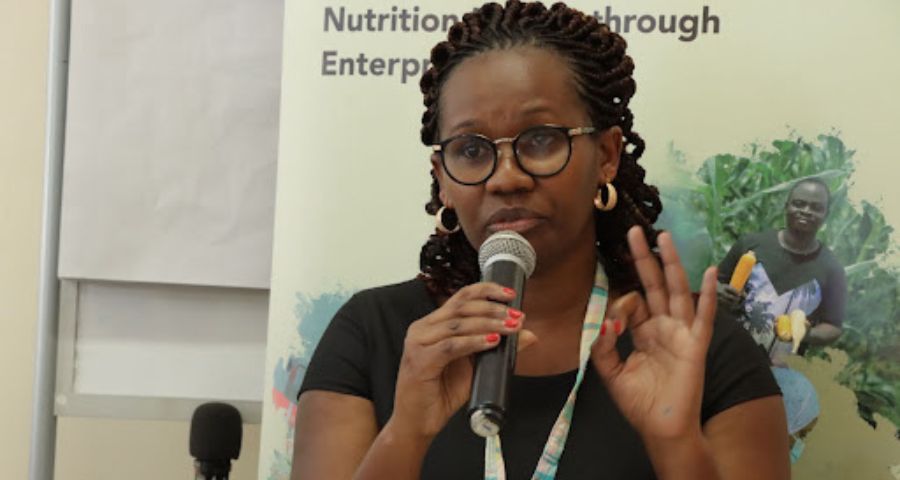
According to a GAIN-led global diet quality study, “Most countries lack routine, current, comparable data on what people eat. Despite its direct links to health and disease, diet quality—in contrast to most other non-communicable diseases, has not been the subject of any global monitoring system.”
The Global Diet Quality Project—a partnership between Gallup, Harvard University’s T.H. Chan School of Public Health, and GAIN, in collaboration with many global stakeholders—aims to bridge this critical gap in global diet quality monitoring by collecting data on diet quality across countries worldwide, and by providing the tools for accurate and feasible diet quality monitoring within countries.
"In Kenya, consumption of vegetables is about 100-130 grams while the World Health Organization recommendation is 400 grams daily of fruit and vegetables. GAIN also looks at consumer awareness by helping the government develop fortification logos and messaging, and at a small scale helping businesses develop market research," stated Margaret Ngetha during the session.
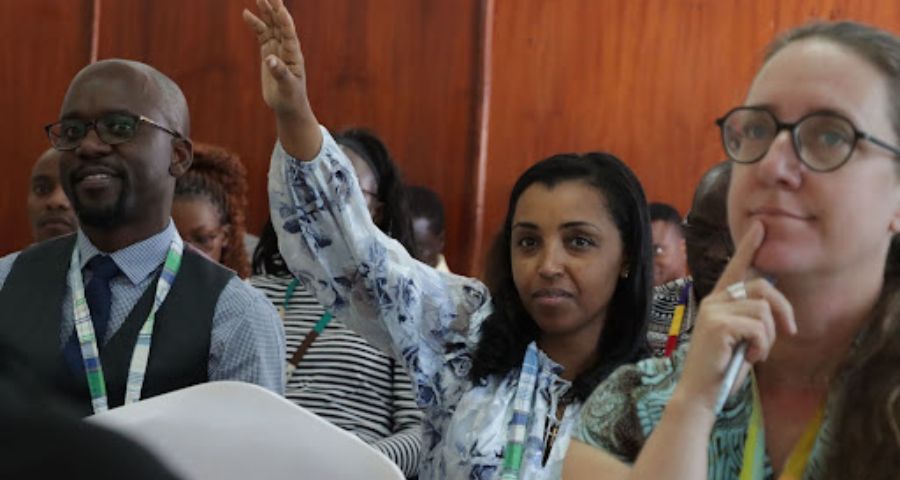
The balancing act of climate change and food production
Climate events that destroy crops and disrupt food supply chains continue exacerbating global malnutrition challenges. According to the Lancet, more than 500,000 deaths are expected in 2050 due to climate-related diet changes.
Agriculture is a key sector in Mozambique's economy, contributing to over a quarter of its GDP and employing over 80 percent of its labour force. In recent years, the high demand for Pigeon Pea from India, for instance, has seen a rapid increase in its production, providing a nutritional and financial boost to the rural economy of Mozambique.
"The effects of climate change have exposed the fragility of our food systems. In Mozambique, as a company, we found pigeon pea is a good, resilient crop that is easy for small farmers to produce. And they have a lot of benefits not only as food but also for cash for the family,” explained Celia Riberio, founder of Luteari Insumos & Servicos Agricola.
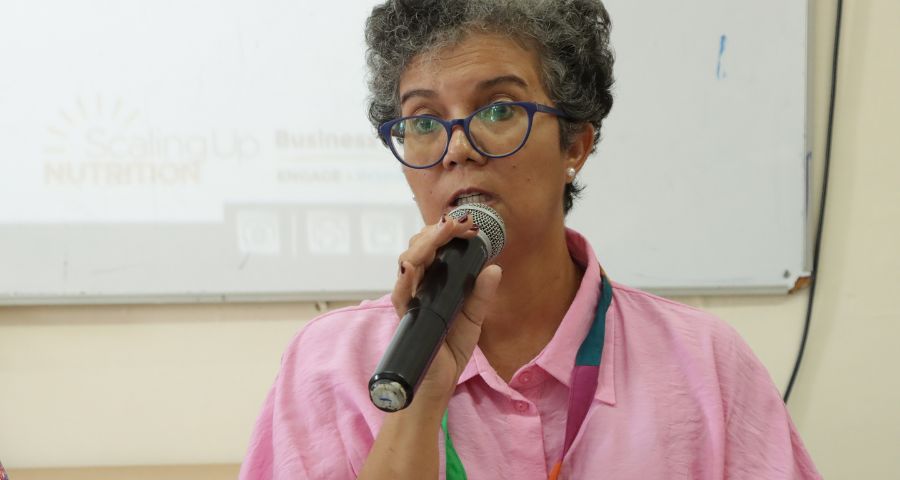
Positive Transformation of our Food Systems
In conclusion, GAIN’s knowledge session underscored the need for sustained and new collaborations between public and private sector actors, as the crucial bridge that unifies the varied objectives of key stakeholders while ensuring the gradual yet sure and positive transformation of our food systems. Public private engagements and the best practices therefrom are driving investments, intentions and actions towards better nutrition for all.
Additional Resources
- Global Alliance for Improved Nutrition (GAIN). Factsheet: Informal food retail in urban areas
- FAO, IFAD, UNICEF, WFP, WHO. The state of food security and nutrition in the world: 2022: repurposing food and agricultural policies to make healthy diets more affordable
- Development Initiatives. 2020 Global Nutrition Report: Action on equity to end malnutrition. Bristol, UK: Development Initiatives; 2020.
- Reardon T, Saweda LO. and Minten B, 2021 Quiet Revolution by SMEs in the midstream of value chains in developing regions Food Security